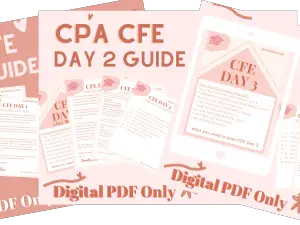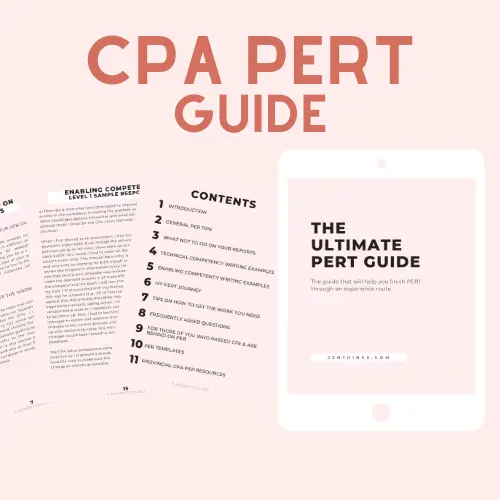I wanted to write this post right after Day 3 but I did what was mandatory: celebrate! I only had two beers but being a lightweight, I already regretted my decision heavily the next morning when I went back to work. The bad sleep on top of my new Invisalign tray meant I had a minor headache all day (I only ever get them since I started Invisalign but usually only last one day). I went to bed early yesterday night and woke up this morning refreshed. Then, work ended early and my celebratory dinner with my college friends who also wrote CFE isn’t until later tonight. So, here is my recap on how Day 3 of CFE went for me.
Like my day 2 post, I will not be discussing any specific AO. This post will be most useful to candidates writing CFE later. If there was one thing I want you to take away from my experience is this: they are not joking when they say time is of the essence on Day 3.
Pre-CFE Day 3 – Remind Yourself
If you read my day 2 post (or you wrote 2021 Sep CFE with me), you would know that we were asked to arrive at our assigned hotel room on average an hour before our exam’s start time. I used that time to get organized and ate breakfast on all three days. However, I was still left with about 30 minutes before exam started. Like on day 2, I mentally reminded myself what my plan was going to be: start case #1 and note the specific start and end times on my rough note. Note, on my way to the hotel, I thought about starting the last case first because per the Board of Examiners’ reports for past CFEs, candidates historically ran out of time on case #3. I thought that would give me an advantage but decided against it at the end as it was such a last-minute decision. Instead, I promised myself I will stick to the time budgets no matter what.
My promise to myself turned out to be the most important strategy on Day 3 (unsurprisingly) and I will share why below.
Are you preparing for CFE and is wondering what you need to know?
Check out my CFE guides here!
Everyone’s Worst Nightmare Ended Up On Case #1
I know there are some candidates out there who excel in tax. I am not one of them. Most of the people I know also aren’t. If you have been following my CFE prep, you would know that I dreaded tax AOs. I tried to make up for it by starting tax technical review early. I definitely went into CFE feeling 100 times more comfortable with tax AO than two months ago but the slightest hiccup/surprise would freak me out again.
Then, I was faced with a complicated tax AO (okay, most tax AOs felt complicated to me but this was next level) on the first and longest case. I would be lying if I told you I didn’t freak out a little. But, I reminded myself I got no time for that. I quickly moved on and finished reading the rest of my case. Before I started typing, I reviewed the list of AOs and checked to see which AOs I can do first (non-integrated). My reasoning for that was to leave myself with the most time to tackle the tax AO. I then started my response. I addressed the Tax AO with what I knew even though I wasn’t 100% sure whether I was right technically or not (most likely more wrong than right). It did not matter because only time mattered at that point. I used the reference guide provided when possible to minimize guessing.
I managed to finish case #1 in less time than suggested. I could have dwelled on the tax AO longer but I decided I will move on to case #2. My reasoning for this is in case I struggle even more with the remaining two cases, I have buffer time. However, I made a mental note (would have been better if I made an actual note in case there were more AOs to re-visit later) to come back to this if I have time left at the end.
Why Did I Not Spend More Time On Case #2
I finished case #2 on time without hiccups. There was an AO I have never practiced before as it was not on any past CFE. However, the technical required was not unmanageable. I did the best I could without going over time. Like for case #1, I probably could have spent more time perfecting my responses. However, I reminded myself once again that time was of the essence. My primary goal should be to attempt as many AOs as possible (ideally, all of them).
I was actually reminded by someone today that the reason why it was extremely important to attempt more AOs than to spend too much time on a hard one. It is because CFE is scaled (I don’t know if this was ever directly confirmed by the BOE but that is what the understanding is) so if you got a NA for not attempting, you will not be scaled up to a NC. However, if you made an attempt on a hard AO, you might be scaled up to a RC (which is exactly what you need for non-MA/FR to pass Level 4) if most candidates struggled.
Case #3 (Last Case) Had The Most Ambiguous Directions
By the time I started case #3, I knew I was tracking well on time. Since case #3 was the shortest case, I would be left with about 20 minutes if I finished case #3 on time. Also, when I was attempting cases, I loved these shorter cases (versus 90-minute case) the most because there would be less to do. However, the case was made challenging by having the most ambiguous directions. Obviously, I don’t think this was an accident. CFE was carefully designed to test more than technical knowledge. For several CFEs (except for the Sep 2020 CFE), the BOE commented on candidates’ lack of time management skills. The time constraint made it challenging to connect the different dots scattered everywhere.
When I read the case for the first time, I had trouble identifying the actual request. They made it obvious that there were FR issues related to a specific part of the business. However, the information you would need to identify and analyze the issue was scattered. I did the same with this case like I did with case #1 – I tackled the manageable ones first. Note, this is not always the best strategy as the BOE reported that candidates had the tendency to spend more time on easy AO and avoid the hard ones. I did it this way because I was aware of how much time I had left. I knew I will need the manageable and clearly directed ones taken care of first before I can focus on the FR issues.
I did not have time to re-read the entire case #3 but I did re-read parts of it to try to make sense of what FR issues there were and what was provided. I managed to finish all three cases with just about 15 minutes to spare. I immediately went back to the tax AO from case #1 and added more information (whether it was right, I really didn’t know). I then took a quick scan to make sure I concluded everything.
I stopped with one minute to spare and felt really happy about what I accomplished.
Conclusion, Conclusion & Conclusion
Forgetting to conclude has been a common theme when I was going through CFE prep. It would have been less of a problem with Day 3 as we only need RCs in most AOs (Finance, S&G, Audit, Tax, MA or FR). However, I did not want that to be the reason why I missed out on a C so I checked to make sure I concluded on Day 3 (on Day 2 as well).
This might sound excessive but I have seen an AO or two on past Day 3 cases that required a conclusion for a RC. Even though this was definitely not the norm, getting into the habit of concluding during your CFE prep will also help with day 2. Even though you should have different strategies for different days, we are bound to sticking to our habit. If our habit is to conclude, you simply have less of a chance of forgetting to do so on Day 2 when it mattered.
Ending Thoughts
Since I only finished CFE two days ago, I obviously have no idea exactly how I did. However, I am confident that I passed (again… if I didn’t, this statement is staying). I believe I attempted most, if not all, AOs over three days whether I felt confident about my responses or not (e.g., I am still doubting how I did on my role AOs). I managed my time (it was extremely difficult to walk away at times) and did not leave an AO half-finished. I can tell you for a fact that my technical knowledge wasn’t the strongest. I didn’t study all the tax topics we ended up getting tested on. I tried my best to draw on what I knew. However, I followed the rules of the game and stuck with my plan.
If you are doubting yourself now, remember that failing the CFE is not the end of the world. I am not saying you did but I am also telling myself the possibility of failing if I did not perform as well as I thought I did. For all I know, I could have missed several AOs that were crucial to passing Level 4.
Failing is part of life and the most important thing is to learn from our mistakes and recover. Be strong and don’t stop believing in yourself.



